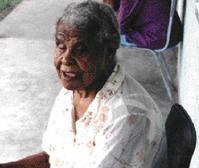By Georgia Hemmings, Outlook Writer
A YEAR AGO, Joymoved back home to care for her elderly mother. Diagnosed with cancer, her mother required help to go to the doctor for treatment and, as the disease advanced, to be fed, bathed and cleansed.
Opal'swidowed mother lives with her now, suffering from Alzheimer's diseases. As her faculties decline, she has to be constantly monitored from danger, be bathed and fed.
Annetteis a single woman with one child. Her 70-year-old mother who used to be so independent is now relying on her more as she copes with arthritis, hypertension and glaucoma. Annette drives to Vineyard Town each morning on her way to work to check on her parent, and does the same in the evenings.
Despite their differing circumstances, these caregivers find that taking care of an infirm, elderly parent is a daunting task. One which puts strain on time, financial resources, job and family responsibilities, even social life. Today, Mother's Day, they reflect on the challenges and adjustments they've had to face in mothering their mothers.
Joy took on her new role willingly enough: "It was my responsibility to care for her as she is my mother. She took care of me in the early years, so it's my turn to care for her in whatever way."
Challenge
The challenge, she now finds, is balancing her full-time job and care-giving responsibilities: "I wake in the mornings and prepare her for the day bathe and dress her, preparing breakfast, giving medications. Then I head out to work for eight hours. In the evenings, I do the same thing all over again before retiring. The hardest part is finding time to take Mom to the doctor and regular therapy, as these tasks must be done during work hours.
"I go in my lunch hour, where possible, and I ask for time off and my employer has been understanding so far. But it irritates me to go for appointments and end up waiting for hours in a doctor's office. I return to work late and have to work late, and end up going home late. It's such a cycle."
Recently, she worked out an arrangement for a neighbour to check on her parent when she has to work late.
Juggling time is also the challenge for Annette, a secretary, who also has to care for a 13-year-old son.
"I have to juggle the demands of my work, alongside the separate needs of my mother and son, a second-former at high school. He is at a crucial stage in his development and I want to be available to provide necessary guidance and advice. But I find that I have to check on my mother daily and provide a listening ear as well as financial assistance." And, while needing her help, her mother maintains her strong views on many issues including medication, which she does not like taking.
"These demands are putting a lot of pressure on me," Annette laments. For Opal, going straight from work to home leaves no time for social activities. She is the only one available to care for her mother, as all her other siblings are abroad. However, they provide financial assistance, and this enables her to employ a caregiver to ease the stress of increasing forgetfulness, delusions and aggressiveness displayed by her parent.
Like a baby
"I love my Mom, but it gets tiring and stressful at times, as she has to be tended to like a baby. And I have to take care of the housework, shopping, washing and doctor's visits. It consumes you so much that you cannot do things for yourself. That's the hardest part about caring for her at home," Opal states.
Finance is another vexatious point.
"The products and services are so expensive, and they drain your pockets," Opal moans.
That complaint is compounded in Joy's case, where there is no additional income: "My mother was a housewife and has no pension, so I have to pay all her bills medical, therapy, medications, nursing supplies, etc. And the costs add up."
Financial costs also cover transportation, shopping for food and clothing and, according to experts, the areas neglected due to the time-consuming nature of providing care.
Other problems include the emotional stress and strain that impact on a caregiver's health. Feelings of anger, resentment, guilt, loneliness and frustration can lead to depression.
"Some days, I'm so fed up with travelling back and forth," says Annette. "And it bothers me that my days are defined by these daily treks, with no end in sight."
Such burnout is common, and experts warn caregivers to watch out for early signs of sadness, anxiety, fatigue and difficulty in concentration.
Opal's experience has made her quite concerned about ageing: "I am determined not to become such a burden on my own children. So I think that I'd rather die early or go into a nursing home once I've reached a certain age."
Adjusting
Joy reflects more philosophically: "A year is a long time to adjust and learn, and the experiences have taught me to be more patient and tolerant. Certainly, I'm more aware of my own vulnerability, and I'm trying to make this period of illness more bearable for me and my mother."
Annette advises others to do some planning: "Siblings should talk among themselves and with their parents before a crisis arises as to how it will be treated. It will settle a lot of things. And I think that we should talk to our children and sensitise them to the issues involved in ageing and growing old."
* Names changed to protect identity.

